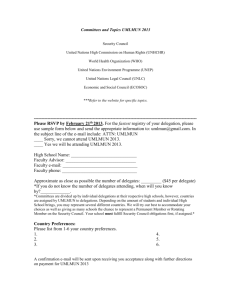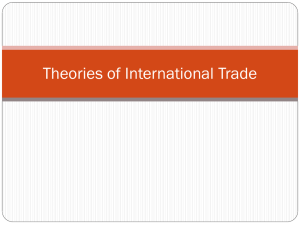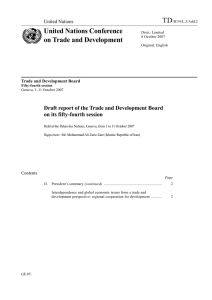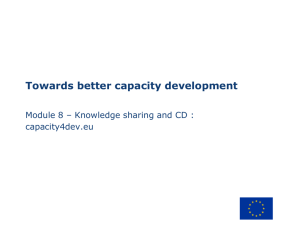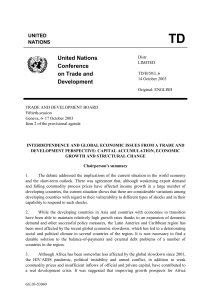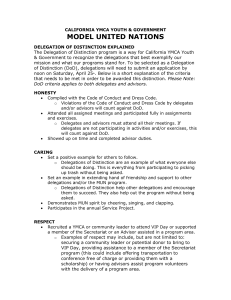TD United Nations Conference
advertisement
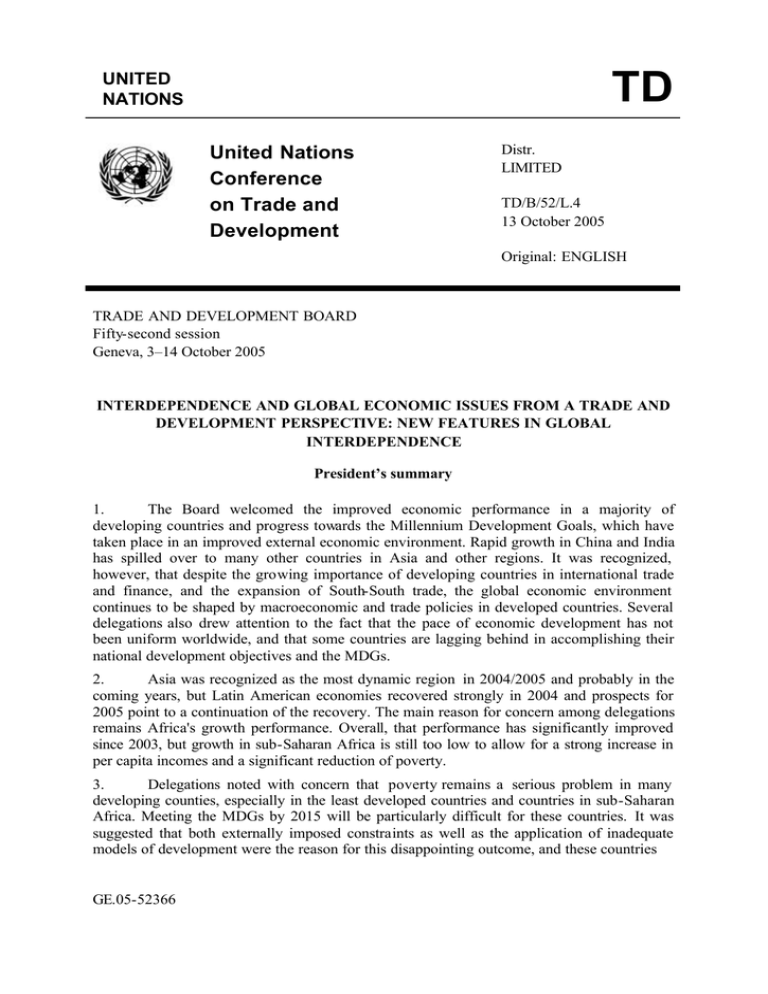
TD UNITED NATIONS United Nations Conference on Trade and Development Distr. LIMITED TD/B/52/L.4 13 October 2005 Original: ENGLISH TRADE AND DEVELOPMENT BOARD Fifty-second session Geneva, 3–14 October 2005 INTERDEPENDENCE AND GLOBAL ECONOMIC ISSUES FROM A TRADE AND DEVELOPMENT PERSPECTIVE: NEW FEATURES IN GLOBAL INTERDEPENDENCE President’s summary 1. The Board welcomed the improved economic performance in a majority of developing countries and progress towards the Millennium Development Goals, which have taken place in an improved external economic environment. Rapid growth in China and India has spilled over to many other countries in Asia and other regions. It was recognized, however, that despite the growing importance of developing countries in international trade and finance, and the expansion of South-South trade, the global economic environment continues to be shaped by macroeconomic and trade policies in developed countries. Several delegations also drew attention to the fact that the pace of economic development has not been uniform worldwide, and that some countries are lagging behind in accomplishing their national development objectives and the MDGs. 2. Asia was recognized as the most dynamic region in 2004/2005 and probably in the coming years, but Latin American economies recovered strongly in 2004 and prospects for 2005 point to a continuation of the recovery. The main reason for concern among delegations remains Africa's growth performance. Overall, that performance has significantly improved since 2003, but growth in sub-Saharan Africa is still too low to allow for a strong increase in per capita incomes and a significant reduction of poverty. 3. Delegations noted with concern that poverty remains a serious problem in many developing counties, especially in the least developed countries and countries in sub-Saharan Africa. Meeting the MDGs by 2015 will be particularly difficult for these countries. It was suggested that both externally imposed constraints as well as the application of inadequate models of development were the reason for this disappointing outcome, and these countries GE.05-52366 TD/B/52/L.4 page 2 continue to depend on external assistance. In this context many delegations welcomed the recent progress with regard to international cooperation in favour of Africa, such as the agreement to double ODA flows, the commitment by a large number of OECD countries to raise their total ODA to at least 0.5 per cent of GDP by 2010, and the decisions to write off the remaining HIPC debt and to consider reducing the unsustainable debt of some equally poor non-HIPC countries. It was underlined, however, that for such debt relief to contribute to achieving the MDGs, it must not come at the expense of aid flows. 4. Several delegations expressed their satisfaction that, so far, the rise in international oil prices has not a had a major negative influence on global growth prospects, mainly thanks to a shift towards less energy- intensive patterns of production in developed countries. However, some delegations expressed concern over the negative impact of higher oil prices on those developing countries that are not benefiting themselves from rising export earnings, such as those depending primarily on exports of agricultural raw materials. 5. There was widespread concern about the increasing global current-account imbalances and the consequences of their eventual correction for the global economy, particularly for the developing countries. It was generally recognized that a more balanced geographical pattern of demand growth would be helpful in correcting these imbalances. The necessary adjustments should be shared by the major surplus economies and the major deficit countries. But it was noted that a correction of the United States current-account deficit that relied exclusively on currency appreciation in some Asian surplus countries, or on a recession in the United States, would have severe deflationary effects on the entire world economy and could lead to a reversal of recent improvements in international commodity prices, with attendant consequences for many developing countries. Consequently, a correction of the imbalances requires broad-based multilateral policy coordination, as well as counterbalancing action in other major surplus economies. 6. It was observed that a number of developing countries, especially in East Asia and Latin America, have registered current-account surpluses, despite strong import growth. Combined with efforts to maintain a competitive exchange rate, this has led to considerable reserve accumulation, but also a concomitant capital outflow. 7. Many delegations drew attention to the continuing volatility of primary commodity prices and to the fact that in real terms commodity prices are still lower today than they were some 20 years ago. They also noted that, due to the widespread foreign firm ownership in extractive industries, higher prices and exports from this sector have also been accompanied by a rise in profit remittances. Several participants suggested that commodity price instability is not in the interest of either producers or consumers and can lead to inefficiencies in factor allocation. A fresh look at the possible mechanisms to reduce price instability in a wide range of commodities so as to minimize its adverse impact on national income could help to strengthen a global partnership for development. 8. There was vigorous discussion on the issue of policy space. On the one hand, delegations from developing countries pointed to the creative, and often heterodox, policies that played a central role in accelerating structural change and capital formation in China and India, while other countries that adhered more to orthodox structural reforms have mostly shown disappointing performances. In their view, the fact that there are substantial differences between the policies in China and India and those of other successful developing countries shows the importance of adequate policy space to tailor development strategies to the specific needs and circumstances of each country. It was further suggested that adequate TD/B/52/L.4 page 3 policy space is also required to enable beneficiary countries to maximize the impact of foreign aid by devising country-specific growth and development strategies. 9. On the other hand, delegations from major industrialized countries expressed reservations with regard to the concept of policy space as such. In the view of one delegation, increased participation of developing countries in the multilateral trade regime would enhance, rather than reduce, their policy space. Another delegation expressed the view that it was not the intention of the São Paulo Consensus to introduce policy space as a new area of work of UNCTAD. It is for each country to determine the balance between national policy space and international disciplines and commitments that it deems appropriate, and to decide in this context to what extent international obligations make it worth giving up national policy space. 10. In light of the present global imbalances, it was generally acknowledged that the future evolution of external conditions for development is uncertain. The volatility of commodity prices poses a serious risk for the sustainability of growth, and better international coordination is required to reduce the instability of commodity prices and excha nge rates. It was also suggested that the international financial system needs to be reformed in order to ensure greater global financial stability. 11. There was broad agreement that the currently favourable external environment is a necessary but not sufficient condition for sustained growth and development; continued domestic efforts for capital formation and structural change are also needed. Higher commodity prices should not lead to complacency, and developing countries should continue to look to diversification as their best long-term strategy. Commodity exporters that have benefited from recent increases in prices and export volumes must maintain their efforts to diversify their commodity sector, as well as to generate higher value added in other sectors. It was also noted that many developing countries have adopted concerted policies for good governance, poverty reduction and open trade in response to Doha, but their efforts have not been matched by greater market access. Indeed, developed countries could help developing countries by granting better market access, and also by facilitating the transfer of technology and increasing financial assistance and debt relief. 12. Some delegations stressed that South-South cooperation, as agreed upon in the New Asian-African Strategic Partnership Declaration, can play an important role in boosting trade and economic relations among developing countries, which should steadily open up their markets for each other's products. Another delegation considered that protectionism is also a problem among developing countries. It was suggested that multilateral efforts under the Doha Agenda might offer better guarantees for South-South trade liberalization than regional trade agreements among developing countries. 13. Many delegatio ns expressed their satisfaction with the balanced and useful analysis provided by the Trade and Development Report 2005. The new features of global interdependence analysed in the Report may require adjustments of national development strategies and policies at the international level. The TDR 2005 was considered helpful for understanding the recent trends in the global economy, especially the interplay between the imbalances in the global economy on the one hand and the implications for developing countrie s of the emergence of East and South Asia as a new growth pole on the other. 14. One delegation observed that the Trade and Development Report’s assessment of the economic situation in some developed countries may be too pessimistic, and that the characterization of the developed countries' trade policy as protectionist is exaggerated, while TD/B/52/L.4 page 4 another would have preferred the Report to pay more attention to the economic experiences of transition economies. 15. Several delegations stressed the important role of UNCTAD in identifying the elements of a coherent global development strategy and providing alternative views on economic policies from a development perspective. It was also suggested that the analytical capacity of UNCTAD should be reinforced and that UNCTAD should further strengthen its cooperation with other international organizations, the private sector and NGOs. 16. Some of the issues addressed in the plenary were given further consideration in an informal session with a panel of experts. Here, it was argued that the global imbalances are largely a problem among developed countries, as the United States accounts for 70.1 per cent of global deficits and the main surplus economies are Japan (20 per cent) and Germany (11.9 per cent), while China accounts for only 7.9 per cent of the global surplus. 17. The panel of experts believed that the current situation is fragile and cannot be sustained over the long term. The external deficit of the United States is financed mainly by Central Banks that invest their foreign exchange reserves in dollar assets, for which eurodenominated assets represent a serious alternative. An adjustment is inevitable, but the way in which it will be brought about was considered to be of critical importance for the performance of the world economy. International burden sharing, involving fiscal consolidation in the United States, more rapid growth in the Euro area, and exchange rate appreciation and somewhat slower growth in China, was considered the least costly way. But even with a “soft land ing”, developing countries will be affected by a slowdown in economic activity in the United States and China. 18. With regard to the specific outlook for the Chinese economy, the panel argued that, while steep currency appreciation should be avoided, it is desirable for the world economy and China alike to achieve greater balance between domestic and external forces of growth. Fostering the services sector could help in both reducing the rate of household savings and providing for more balanced growth. Similarly, faster income growth in the rural areas would not only lead to a better geographical distribution of development but also help to raise domestic demand, which could compensate for slower export growth as a result of exchange rate appreciation or lower exports to the United States. 19. Panellists suggested that the current situation in the world economy is characterized by insufficient investment (rather than a “savings glut”), and the overabundance of international financial capital could easily lead to up ward pressure on the exchange rates of emerging- market economies, thereby heightening the risk of financial crisis. At present, many developing countries are accumulating foreign exchange reserves in order to avoid such overvaluation and to enjoy “export- led” rather than “debt-led” growth. Reserve accumulation is also undertaken as insurance against speculative attacks and to avoid situations where resort has to be taken to highly conditional IMF lending. 20. With regard to commodity prices it was suggested that income, rather than price, fluctuations are the real problem. In order to stabilize earnings, one might consider making the IMF’s Compensatory Financing Facility more attractive for developing countries; marketbased price risk management instruments are not a solution for most developing countries. One delegation suggested that Governments of oil and mineral-rich countries benefiting from windfall gains might consider the Norwegian example of establishing a national commodity fund and spending only a limited share of its proceeds. It was recognized that the pressing needs for investment and public spending in developing countries make it difficult to find political support for maintaining this course of action. TD/B/52/L.4 page 5 21. There was a widespread perception in the Plenary as well as in the discussion with panellists that, in the mutual interest of all, developed countries should strengthen their efforts for macroeconomic policy coordination to solve the global imbalances and that developing countries should continue their efforts for greater diversification and industrialization, as well as avoidance of higher indebtedness, keeping in mind that the present favourable conditions for many of them might be temporary. *** ** ***
